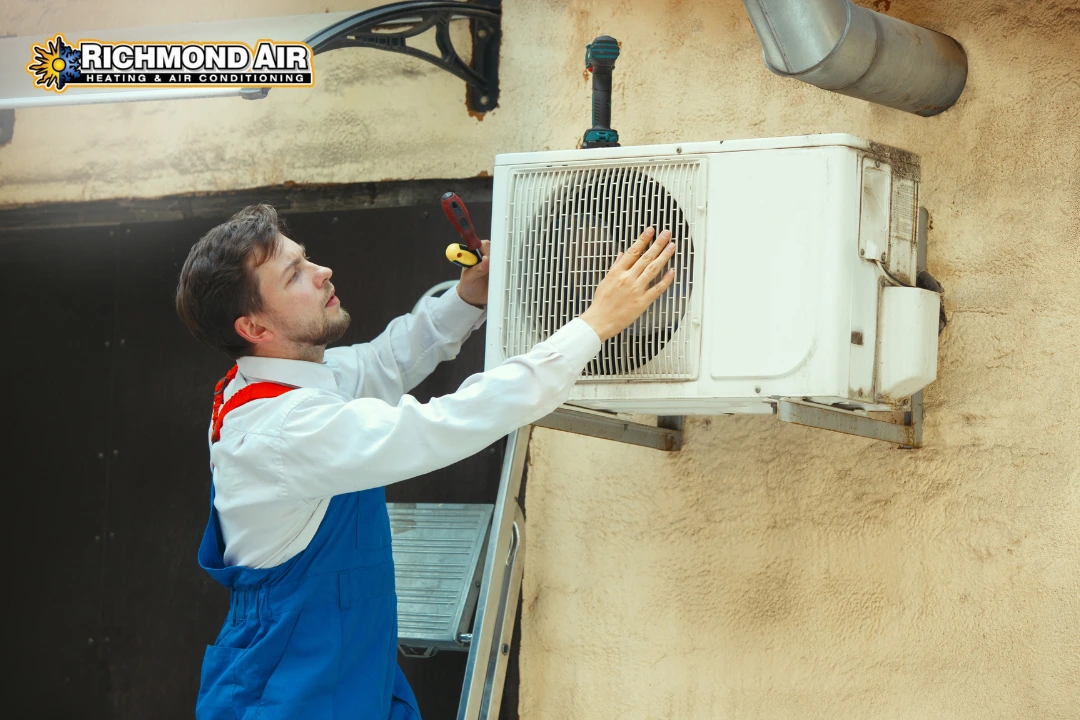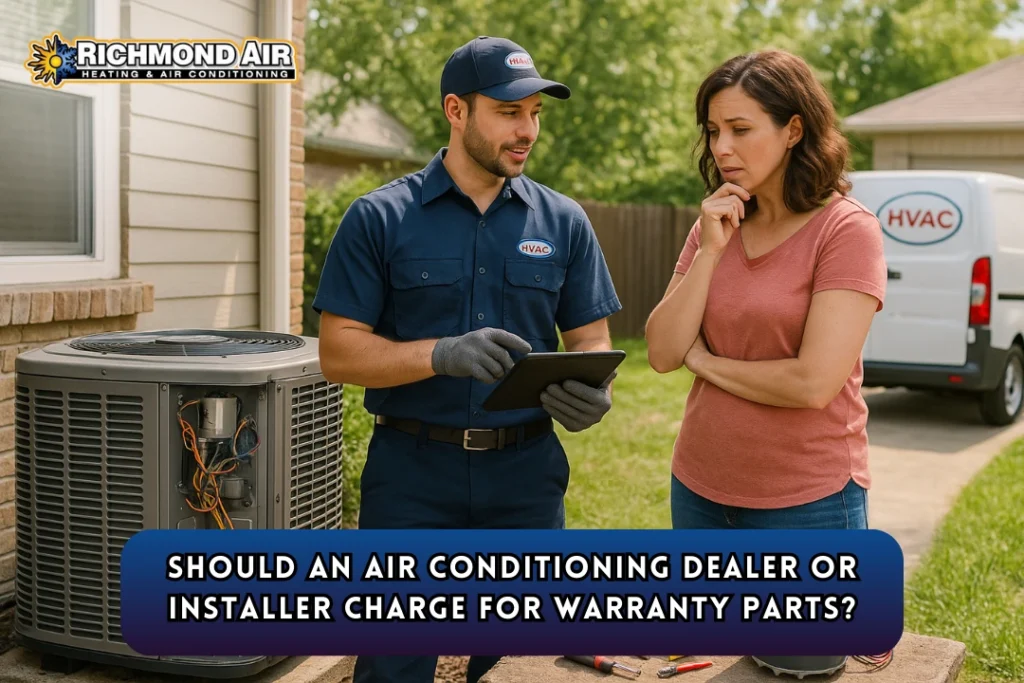Ever been surprised with a bill for something you thought was covered under warranty? You’re not alone. As an HVAC expert at Richmond Air, I once spoke with a homeowner who had service done by another company and was shocked to receive a $150 invoice for a “free” compressor replacement.
The part was covered under warranty, but no one had explained the labor and shipping charges, and they felt blindsided. That experience is what inspired me to write this post. HVAC warranties can be confusing, especially when it comes to who pays for what. In this guide, I’ll break it down so you know what to expect and how to avoid surprise charges.
Should an Air Conditioning Dealer Installer Charge For Warranty Parts
Table of Contents
ToggleIn most cases, air conditioning dealers should not charge for warranty parts, as these are covered by the manufacturer. However, they may charge for labor, shipping, or processing. Always check your warranty terms to know exactly what’s covered.
Understanding HVAC Warranties
When it comes to HVAC warranties, not all coverage is the same — and that’s where many homeowners get confused.
Manufacturer vs. Labor Warranties
Manufacturer warranties typically cover major components like compressors or heat exchangers for a period of 5 to 10 years. However, these warranties usually do not include labor costs. According to the Federal Trade Commission, unless a separate labor warranty is purchased or offered by the installer, homeowners are generally responsible for labor charges during repairs.
The FTC classifies this type of coverage as a “limited warranty,” since customers may still be required to pay for related expenses like labor or shipping, even when the part is fully covered.
Extended Warranties
These are optional add-ons that can give you longer protection and may include both parts and labor. Some come directly from the manufacturer, while others are third-party plans. They’re worth considering if you want peace of mind after the basic coverage runs out.
Understanding the difference between these warranties helps you avoid unexpected costs and know who to call when something breaks.
What Do HVAC Warranties Typically Cover?
HVAC warranties are meant to protect your investment, but knowing exactly what they cover can save you from surprise expenses down the road.
Parts Coverage
Most manufacturer warranties cover major components like the compressor, condenser coil, evaporator coil, and fan motors. These are the “big ticket” items that can be expensive to replace. Some warranties also include minor parts like capacitors or circuit boards, but this varies by brand.
Labor Coverage
Here’s where many homeowners get caught off guard: manufacturer warranties usually do not cover labor. That means even if a part is replaced for free, you could still be charged for the technician’s time, diagnostics, and travel. Labor coverage, if included at all, typically comes from the installer or through an extended warranty.
Common Exclusions
Warranties often exclude things like filters, refrigerant, wiring issues, and damage caused by improper installation or lack of maintenance. If your system hasn’t been regularly serviced or wasn’t registered within a certain period (usually 60-90 days after installation), your warranty might be reduced or voided entirely. Damage from weather events or power surges is also not typically covered.
So while HVAC warranties offer valuable protection, they’re not a free pass for every repair — knowing the fine print matters.
The Role of the Installer in Warranty Claims
When it comes to warranty claims, the installer plays a much bigger role than most homeowners realize. While the manufacturer provides the actual part, it’s usually the installer who handles the legwork to get that part replaced.
Installer Responsibilities
Your HVAC installer is often the middleman between you and the manufacturer. They verify whether your unit is still under warranty, diagnose the issue, and determine which parts are eligible for replacement. In many cases, they’re also the ones who request the replacement part from the manufacturer and install it once it arrives. Without the installer, the warranty process would be nearly impossible for most homeowners to navigate on their own.
Administrative Tasks
There’s a surprising amount of behind-the-scenes work involved. Installers have to gather proof of installation, equipment serial numbers, warranty registration details, and service history. Then they submit paperwork to the manufacturer, follow up on approvals, and track shipping for the part. All of this takes time, often hours, which is why some companies may charge a small processing or handling fee. It’s not just about the part itself; it’s about the coordination that makes the replacement happen smoothly.

Charging for Warranty Parts: Is It Justified?
When a part on your HVAC system fails under warranty, it’s easy to assume that everything should be free. After all, isn’t that the point of a warranty? The answer is both yes and no—and it often depends on who’s handling what.
Manufacturer Policies
Most HVAC manufacturers do cover the cost of parts during the warranty period. If your unit was registered properly and is still within the coverage window, the manufacturer typically sends the replacement part at no cost. That’s the straightforward part. What the warranty doesn’t usually include is labor, shipping, or the time it takes someone to process the claim and install the new part.
Installer Charges
This is where some costs may come in. While the part itself is free, your installer might charge you for:
-
Shipping fees: Some manufacturers don’t pay to ship the part, and installers have to cover that cost upfront.
-
Handling or restocking fees: Occasionally, parts need to be returned or handled in specific ways that cost time and money.
-
Labor: If the warranty only covers the part, you’re still responsible for paying someone to install it.
From the installer’s perspective, they’re not making money on a free part—they’re investing time, fuel, and manpower to coordinate the replacement.
In one case, a client I spoke with had a motor fail during the warranty period. The part itself was covered by the manufacturer, but their previous installer charged them over $200 for shipping and labor. I helped them understand the warranty terms more clearly and guided them on how to navigate the charges. It was a good reminder that unless everything is explained upfront, homeowners can easily feel confused by what’s actually covered.
Ethical Considerations
So, is it fair to charge customers for these extras? That depends on how transparent the installer is. If they explain the charges clearly and they’re reasonable (i.e., not marked up unfairly), many homeowners understand.
But when fees appear out of nowhere or feel inflated, it naturally feels wrong. Ultimately, fairness lies in clarity. Installers who communicate early and honestly about potential costs earn more trust, and repeat business, than those who leave customers guessing.
When your HVAC system is under warranty, you might assume that everything — parts, labor, and paperwork — is covered. But then, some homeowners are surprised to see a “warranty processing fee” on their invoice. So, what is this fee really about?
What is a Warranty Processing Fee?
A warranty processing fee is a charge some HVAC dealers or installers apply to cover the time and effort it takes to handle your warranty claim. While the manufacturer might supply the replacement part at no cost, someone still has to file the claim, coordinate shipping, schedule the repair, and make sure the paperwork is complete. This behind-the-scenes work is what the processing fee covers.
Why Do Installers Charge These Fees?
From the installer’s perspective, processing a warranty claim isn’t always quick or simple. Here are a few reasons they might charge this fee:
-
Administrative Time: It takes time to contact the manufacturer, fill out forms, and follow up on parts.
-
Shipping & Handling: Sometimes, manufacturers provide the part for free but charge shipping — which the installer may pass on to you.
-
Technician Scheduling: Coordinating a tech visit to replace the part might still involve their usual labor costs.
-
Overhead Costs: Some businesses see this fee as a way to cover small but necessary business expenses tied to warranty work.
From what I’ve seen working with Richmond Air, processing a warranty claim can take more time than most people expect, from phone calls and paperwork to follow-ups and part tracking. That’s why some dealers add a processing fee to cover the effort involved, although not all take the time to explain those charges clearly to the customer.
Customer Perspective: Is This Fair?
From a homeowner’s point of view, it can feel frustrating. If your system is under warranty, why are you paying anything at all? Many customers expect “warranty” to mean 100% free. So when they’re hit with a surprise fee — especially without clear communication, it can feel like a bait-and-switch.
That’s why transparency is key. Good HVAC companies explain these fees upfront and clarify exactly what’s covered by the manufacturer and what isn’t. When installers are honest and informative, customers are far more understanding.
Legal and Regulatory Considerations
When it comes to charging for warranty work, especially in places like Richmond, VA, the rules aren’t always black and white. HVAC companies need to follow local laws and industry standards, but homeowners also need to know their rights — and what dealers are allowed to charge for.
Regional Regulations in Richmond, VA
In Richmond and across Virginia, there’s no universal law that says HVAC installers must perform all warranty repairs free of charge. However, installers are legally required to honor the manufacturer’s parts warranty, meaning they can’t charge you for a replacement part that’s covered.
Where it gets tricky is the labor, handling, and processing fees, these are often left to the discretion of the installer unless specifically prohibited by a contract or state law. Some companies use this gray area to add fees that aren’t clearly explained unless the customer asks. That’s why it’s important to deal with licensed, reputable contractors who follow both the letter and the spirit of local consumer protection laws.
If you feel misled about a warranty charge, you can file a complaint with the Virginia Department of Professional and Occupational Regulation (DPOR), which oversees HVAC licensing and contractor behavior.
Disclosure Requirements: Why Transparency Matters
Even if extra fees are allowed, they should never come as a surprise. Installers are expected — and in many cases, legally required — to clearly disclose:
-
What is and isn’t covered under the warranty.
-
Whether there are any labor or processing fees.
-
How much you might be expected to pay out-of-pocket.
This information should be presented in writing, either in your original service agreement or at the time of scheduling a repair. Customers should never have to chase down answers or feel blindsided after the work is done. The best HVAC companies are upfront, clear, and happy to explain any charges before a technician ever steps into your home.
Disclaimer: This information is for general guidance only. For advice specific to your situation, please consult a qualified attorney or legal expert.
3 Best Practices for Homeowners
When it comes to HVAC warranties, a little preparation can save you a lot of stress (and money) down the line. Here are some smart steps every homeowner should take:

1. Review Warranty Terms Carefully
Before assuming something is covered, take time to read your warranty documents — both the manufacturer’s and the installer’s. Pay attention to what’s included, what’s excluded, and how long each part of the warranty lasts. Some warranties only cover parts, while others might include labor for a limited time.
Knowing the fine print helps you avoid misunderstandings when something breaks down.
2. Don’t Be Afraid to Ask Questions
Before any repair is scheduled, ask your HVAC company the important stuff upfront:
-
Will there be any charges for this warranty repair?
-
Is labor or shipping included?
-
Are there any processing fees?
A reputable installer will explain everything clearly. If they can’t give you straight answers, that’s a red flag.
3. Keep Good Records
Save all your receipts, service agreements, installation documents, warranty papers, and even emails or text messages related to your HVAC system. If there’s ever a disagreement about coverage, these records can protect you, and help speed up warranty claims.
Pro tip: Keep everything in a dedicated digital folder so it’s easy to access when needed.
Personally, I keep all my HVAC paperwork, invoices, warranty cards, and service reports, in one digital folder. It’s come in handy more than once when I’ve needed to reference details during a warranty repair or troubleshoot a past issue.
By staying informed, asking the right questions, and keeping organized records, you can protect your investment, and avoid surprises when it’s time to make a warranty claim.
Need honest, expert HVAC service in Richmond, VA? At Richmond Air, we proudly serve Richmond and the surrounding areas with reliable repairs, transparent pricing, and professional warranty support. Contact us today to schedule your service or get a free estimate!
Final Thoughts
Understanding your HVAC warranty isn’t always simple, but knowing what’s covered, and what isn’t, can save you from unexpected bills. While parts are typically free under manufacturer warranty, dealers may still charge for labor, shipping, or admin time.
FAQs
Does an AC warranty cover both parts and labor?
Most standard HVAC manufacturer warranties cover only specific parts, like the compressor or heat exchanger, but not the labor needed for repairs. However, if you have an extended warranty, it may include both parts and labor, offering extra protection beyond the basic coverage.
Do you have to pay out of pocket for warranty repairs?
In general, if a repair is fully covered under warranty, you shouldn’t have to pay for the part itself. However, unlike auto warranties where the dealership usually handles everything, HVAC warranties may still involve costs like labor or service fees unless you have a comprehensive plan.
Is labor included in HVAC warranties?
Labor isn’t always part of a standard HVAC warranty. Most factory warranties focus on the equipment itself, covering defects in materials or manufacturing. To get labor included, you typically need either a labor warranty from the installer or an extended warranty that covers service costs.
Can I negotiate the price with an HVAC company?
In some cases, yes — especially for larger installations or repairs. While not all contractors are flexible, some may offer discounts or price matching. Still, experienced HVAC professionals know their costs and often provide quotes that reflect the value and quality of their work.
Can an HVAC company deny warranty service?
Yes, under certain conditions. If the system was damaged by improper installation, neglect, or unauthorized repairs, the dealer or manufacturer may refuse to cover the repair. It’s important to follow maintenance guidelines and use qualified professionals to keep your warranty valid.
Why is replacing an AC compressor so costly?
The AC compressor is one of the most expensive parts of your cooling system. It’s a complex component that requires specialized tools and several hours of labor to replace. On top of that, the technician may need to flush the system, refill refrigerant, or replace related parts, which adds to the total cost.


